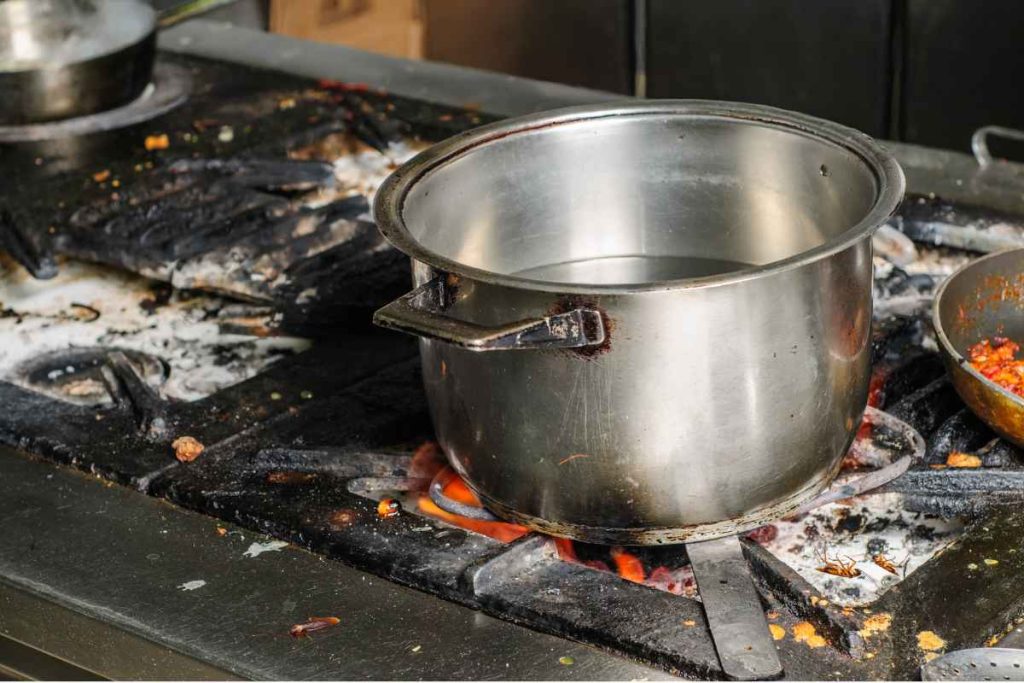Inadequate café pest control is bad for business and against the law. Sadly, many business owners think they can tackle restaurant pest control in house, often with catastrophic outcomes. In recent years, one popular inner-city Brisbane seafood restaurant was fined $15,000 after cockroaches were found on the premises. Brisbane City Council is known to reach out to the media to name and shame businesses that do not meet their food safety guidelines. Could your business withstand the reputational damage let alone the downturn in revenue that a pest outbreak would cause?
Let us help you get the best pest control for restaurants plan in place, so you are prepared when the health inspector comes knocking. And trust us, they will come knocking. As experts in this space, we are happy to provide you with this detailed checklist explaining how to get your food industry pest control sorted.
Pest Control in Restaurant Kitchens: What Are the Risks?
Due to the nocturnal habits of most pests, contamination of food can go unnoticed for some time. Before you know it, the infestation will be large enough for pests to be spotted by customers. At this point, it becomes difficult and costly to eliminate a large infestation.
Then there is the risk of complaints that lead to big fines and business closure. You’ll likely be alarmed to learn that pests transmit food poisoning micro-organisms, can damage food and food packaging, and may contaminate food with their bodies, faeces, urine, and hair. In addition to contaminating food, rats and mice might nest in roof spaces and damage cables and pipes by gnawing. That’s why it is best to prevent them from entering your premises and have a plan in place to remove them if they do.
Restaurant Pest Control: Understand Your Responsibilities
All Queensland food businesses need to be aware of their obligations under the Food Act 2006. According to the Queensland Government, a pest is any animal that can contaminate food, either directly or indirectly. This includes, but is not limited to, birds, rodents, insects, and arachnids (spiders). As a restaurant or café operator, you must prevent pests, to the extent that it is practicable, from entering your premises and eradicate any pests that do enter.
Additionally, you need to obtain a food licence from your local council. To ensure food businesses are operating at high levels of compliance, many local councils have implemented a regulatory scheme based on a star rating system. This system is the Eat Safe program, and you can find out more about the program for your community:
The Redland City Council and City of Moreton Bay Council do not operate a star rating system but they do require businesses to have a food licence and comply with the Food Act 2006.
What Are the Most Common Pests in Café Kitchens?
So what pests are you most likely to find in your food business? Here is a brief list of the most common pests we find in Brisbane restaurants and cafes:
- Cockroaches: Cockroaches live and hide in sewers and drains. They like dark and moist areas – especially kitchens. Roaches are known to spread bacteria. Studies show that cockroaches can spread more than 33 kinds of bacteria, including salmonella.
- Flies: Flies lay their eggs in warm, moist places like waste food and rubbish. In high summer temperatures, the egg can develop into a maggot, and then an adult fly, in as little as ten days. A fly eats by vomiting liquid from its stomach onto food to break it down into a liquid it can easily consume. The vomit contains bacteria, which are then spread onto food and equipment. The fly also carries bacteria on its feet, hair and in its faeces. Needless to say, you must do everything to keep flies away from of your business premises.
- Rats and mice: Twenty percent of the world’s food supply is believed to be contaminated by rodents. Vermin can ruin food crops, buildings, and electrical cables, as well as spread diseases. Most of the damage they do is physical, like gnawing. Food can become contaminated by their droppings, urine, and hairs.
Pest-Proofing Measures That Work
The type of pest-proofing measures required for your business will depend on where you are in Queensland. However, these general measures will limit access by pests in all locations.
- Pest-proof doors and entrances into the building with flyscreen doors or self-closing doors
- Install mesh screens at opening windows or other ventilation openings
- Ensure drains, grease traps and ventilation pipes are sealed
- Seal openings where pipes pass through external walls to prevent pests such as rats and mice entering food handling areas
- Keep food premises and transport vehicles clean and tidy
- Install appropriate flashing to the base of wooden doors if there is a problem with mice gaining access through doorways
- Check deliveries for pests and droppings, and if any food is found to be contaminated, refuse the delivery and contact the supplier
- Remove waste regularly and store away from food handling activities
- Call in professionals to help.

How Often Should You Engage Restaurant Pest Control Services
Under the Brisbane City Council’s Eat Safe program, which rates all Brisbane food businesses for their compliance to food safety standards, businesses that fail to achieve a high rating are more regularly audited by inspectors. So, one slip up with pest control will have you on the hit list. This is why it is important to have your restaurant and café pest control plans in place.
Regular treatment by a professional pest control operator is strongly recommended by the government as we are skilled in the safe application of pesticides in a food premises. It’s not worth the risk to DIY pest control. You don’t want to get the bugs treated only to poison a customer with the chemicals you have used.
Even if you think you don’t have any pests, working with an expert pest controller to develop an annual pest prevention plan will help your business comply with legislation. Then in the unlikely event that an outbreak occurs, we can act quickly and minimise the damage.
A good pest management plan will cover:
- The types of pests and treatments to be used
- Areas that need inspection and treatment (e.g. behind appliances and equipment, inside wall cavities and cupboards, under and inside boxes and packaging)
- Locations of pest control devices and pesticides. They must be placed where pesticides or killed pests can’t come into contact with food or food contact surfaces (e.g. not above food preparation areas). A site map of where devices and pesticides are located is essential.
- How often inspections and treatments need to be done – this will depend on the location, climate, food activities, type of pests and activity. Regular inspections and treatments will ensure expired pesticides aren’t used and baits are replaced or reset, and dead pests are removed.
- An ongoing record of pest inspections and the treatments delivered.
Make sure your pest controller uses pesticides that are approved for use in food premises and include safety and expiry information.
DIY Pest Control for Restaurants Is Far Too Risky!
Pest Control in restaurant kitchens is serious business. Professional pest controllers like our team at Brisbane City Pest Control have relevant legislation requirements they need to adhere to ensuring you are reducing the risk of cross contamination and other hazards. You already have cashflow, staffing and other everyday business matters to attend to. Outsourcing pest control to the North Brisbane commercial pest control experts is one way to reduce your workload whilst ensuring you can keep the doors open.
We offer comprehensive commercial pest control audits and preventative treatments so you know exactly what pests may exist on your premises and how best to tackle them should they become an issue. After we’re done, our technicians will present you with a thorough inspection report along with professional recommendations before sending an electronic copy of the report for your records.
In addition to food businesses, we can help with school pest control, hotel pest control, and all requests for pest control services, Brisbane and surrounds. Together, we can help your business remain hygienic and compliant by deterring and preventing pests from invading the space.
Contact Brisbane City Pest Control today to discuss your requirements or make a booking.

